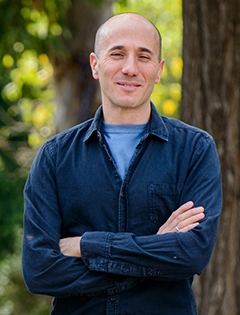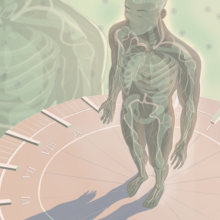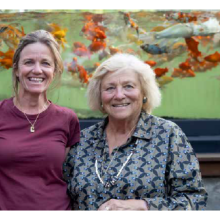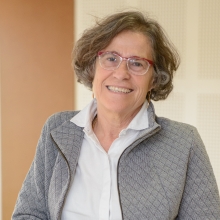Lighten up
Dr. Ofer Yizhar’s research uses neural illumination to conquer fear
Briefs

The retention of fearful memories—as occurs in post-traumatic stress disorder, or PTSD—can bring people to a very dark place. Now, Weizmann Institute scientists have shown how shining light on a specific area of the brain can loosen the grip of such memories, and reduce fear-associated behavior.
In a study reported in Nature Neuroscience, a team led by Dr. Ofer Yizhar of the Department of Neurobiology demonstrated that it is possible to reduce the acquisition of “cued” responses to frightening memories through the use of optogenetics - a technology that renders individual, highly specific brain cells photosensitive and then activates those cells using flashes of light.
The investigation was conducted with postdoctoral fellows Dr. Oded Klavir (now an investigator at the University of Haifa) and Dr. Matthias Prigge, both from Yizhar’s lab in the Neurobiology Department, together with departmental colleague Prof. Rony Paz and graduate student Ayelet Sarel.
Short-circuiting the message
In the team’s experiments, mice were exposed to fear-inducing conditions in parallel with a sound that the mice learned to associate with fear. After the sound-fear association was firmly established, the researchers used laser light to activate specific cells in the mouse brain. As a result, the mice no longer startled when they heard the sound, “forgetting” they had previously been frightened.
In a separate set of experiments, the optogenetic illumination was shown to promote “extinction learning”—a gradual decrease in the conditioned response to a fear-inducing stimulus. Similar to how some human PTSD sufferers eventually become resilient in the presence of a stimulus that once triggered a trauma sensation, the habitually fearful mice displayed a lower level of fear after treatment.
The cells targeted by Dr. Yizhar and his team are known to be involved in communication between two different areas of the brain - the amygdala, which plays a central role in emotion, and the prefrontal cortex, involved in the storing of long-term memories. Previous studies had suggested that the interactions between these two brain regions contribute to the formation and storage of aversive memories, and that these interactions are compromised in PTSD. However, the exact mechanisms behind these processes were unknown.
The researchers used a genetically engineered virus to mark those amygdala neurons that communicate with the prefrontal cortex. Next, using another virus, they inserted a gene encoding a light-sensitive protein into these neurons. When they shone a light on the brain, only the neurons containing the light-sensitive proteins became activated, making it possible to map out the neurons in the prefrontal cortex that receive the amygdala neurons’ signals.
Moreover, the scientists established that high-frequency light stimulation of the amygdala neurons reduced these cells’ communication with the prefrontal cortex. The procedure both interfered with the establishment of a conditioned fear response in behaving mice, and also tamped down the intensity of fear responses associated with particular cues that had been previously acquired, making those fears easier to overcome.
By clarifying how signals that bridge two areas of the mammalian brain contribute to the fear response, the team’s findings may eventually help clinicians establish medical protocols for the treatment of traumatic memories in humans.
“It’s easier to remember things you care about, be they good or bad; but it’s also the reason that memories of traumatic experiences are often extremely long-lasting, predisposing people to PTSD,” Dr. Yizhar says. “A better understanding of the neural circuitry responsible for the acquisition and retention of fear - combined with the ability to manipulate these circuits - may contribute to rehabilitation regimens aimed at re-establishing emotional resilience.”
Dr. Ofer Yizhar’s research is supported by Jean-Charles Schwartz and Marc – Antoine Schwartz; the Adelis Foundation; the Candice Appleton Family Trust; Paul and Lucie Schwartz, Georges; and the Vera Gersen Laboratory. Dr. Yizhar is the incumbent of the Gertrude and Philip Nollman Career Development Chair.

Dr. Ofer Yizhar








